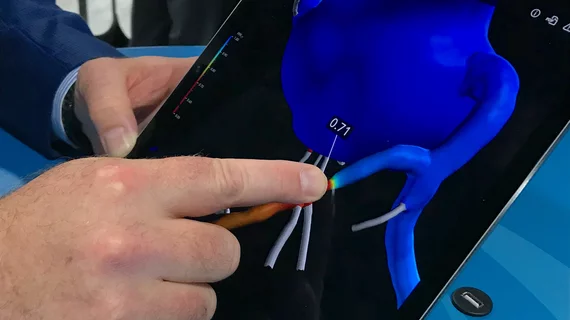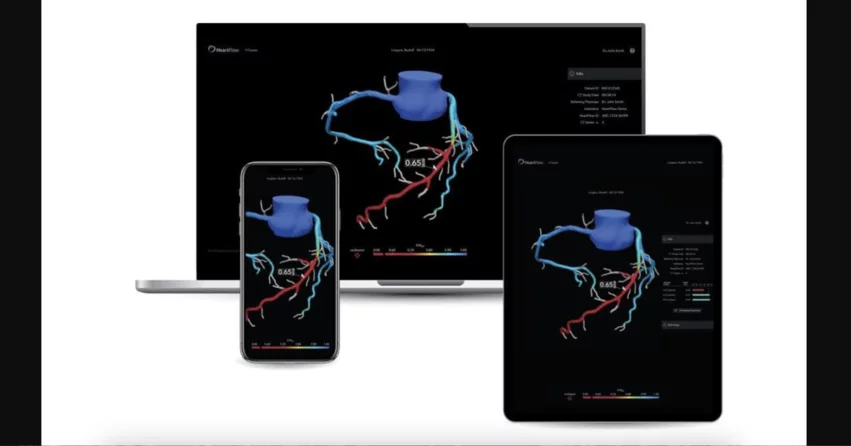New data highlight long-term benefits of HeartFlow’s AI-based CAD evaluations
HeartFlow, a California-based healthcare technology company known for its non-invasive artificial intelligence (AI) technologies, has shared new seven-year data demonstrating the long-term impact of its AI-powered FFRCT Analysis and Plaque Analysis offerings.
The data were presented Sunday, Oct. 27, on the opening day of TCT 2024 in Washington D.C.
First, researchers shared data from the ADVANCE-DK study, a subanalysis of the larger ADVANCE registry, that confirmed FFRCT Analysis and Plaque Analysis can help care teams anticipate when coronary artery disease (CAD) patients may face future adverse cardiovascular events. A prior three-year update had found that patients with abnormal FFRCT and high plaque burden were much more likely to experience an adverse event than patients with only abnormal FFRCT findings or high plaque volume. This seven-year update established that, yes, the same findings were still true after examining another four years of follow-up data.
“We theorized that by leveraging non-invasive FFRCT we could identify critical issues that had previously gone unnoticed, such as significant coronary lesions that would likely have been mistakenly categorized as visually insignificant,” Kristian Tækker Madsen, MD, a cardiologist at University Hospital of Southern Denmark, said in a statement. “The prospective data with long-term follow-up in ADVANCE-DK alongside Plaque Analysis data gave us far more than that. FFRCT remains valuable for patients across all categories, and the combination of FFRCT and quantitative plaque data, especially after four years of follow up, can offer providers invaluable insight into a patient’s long-term risks informing more personalized and effective treatment plans.”
A second analysis explored data from ADVANCE-DK to track the benefits of using coronary CT angiography (CCTA) with and without HeartFlow’s FFRCT Analysis software in high-risk patients with non-ST-segment elevation acute coronary syndrome (NSTE-ACS). The study’s authors confirmed that evaluating CCTA results can help care teams avoid a significant percentage of unnecessary invasive assessments, and using FFRCT Analysis on top of that provides an even greater impact on limiting such treatments.
In addition, the use of CCTA alone was associated with an area under the ROC curve (AUC) of 0.65 for identifying significant lesions likely to benefit from revascularization. Using FFRCT Analysis to assess those findings increased that AUC all the way to 0.84.
“The ADVANCE-DK data show that our technologies go beyond identifying the immediate risks of CAD to include long-term residual risks across the spectrum of the disease” Campbell Rogers, MD, HeartFlow’s chief medical officer, said in the same statement. “Data from patients with high-risk NSTE-ACS further suggest lesion-specific FFRCT provides an enhanced capability to avoid unnecessary invasive tests. With HeartFlow, clinicians receive actionable insights and data that are currently missing from traditional non-invasive and invasive diagnostic tools.”
The findings from this second analysis were simultaneously published in EuroIntervention.[1]
A full video about these findings is available here.
HeartFlow’s busy month continues at TCT
HeartFlow entered TCT riding a considerable amount of momentum due to some significant updates to U.S. healthcare policies. First, the company’s Plaque Analysis software received improved Medicare coverage as a result of a new local coverage determination (LCD) approved by four of seven Medicare Administrative Contractors (MACs).
Then, the American Medical Association (AMA) issued a new Category I CPT code that covers the same software. Category I CPT codes are permanent and only used for established medical procedures, technologies and services.
Even more good news came just days later, when a fifth MAC agreed to cover Plaque Analysis going forward. This decision ensures that even more Medicare patients now have full access to HeartFlow's AI-powered software.
“We commend the MACs for recognizing the value and critical role of AI-enabled plaque quantification technologies in cardiovascular disease management,” John Farquhar, HeartFlow’s CEO, said in a statement celebrating the latest update.


